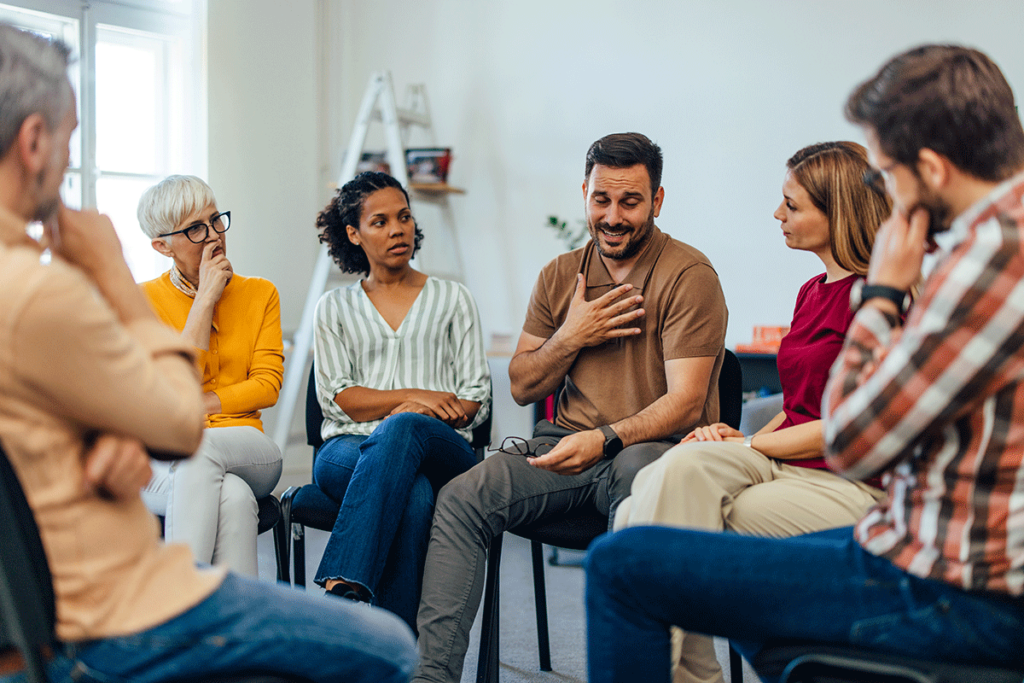Imagine a space where you’re not just a patient in a program but part of a supportive community. Group therapy can offer that sense of belonging, where the journey toward recovery becomes a shared experience. At Woodland Recovery Center, we understand that the weight of addiction doesn’t have to be carried in isolation. You deserve a space where you can express yourself, connect with others, and learn skills that will carry you back into everyday life, all while surrounded by people who genuinely care about your progress. Call us at 662.222.2989 today to learn more about the group therapy activities we offer at Woodland Recovery Center.
Group Therapy Topics
Group therapy is more than just a gathering of individuals; it’s a community. A group therapy session typically involves a licensed therapist facilitating discussions among a small group of people who share common experiences, such as battling substance use disorders. It provides a supportive environment where clients can share their stories, gain insights from others, and build essential skills for recovery. Here are some topics that are commonly addressed:
- Relapse prevention
- Healthy coping mechanisms
- Self-esteem and identity
- Relationship building
- Setting boundaries
- Life skills
These topics encourage open conversation and provide clients with tools to handle real-world situations. By addressing such varied aspects, Woodland Recovery Center clients can develop a holistic understanding of their recovery journey.
Group Therapy Activities for Addiction Recovery
Group therapy can be a life-changing experience, and the activities we do together are at the heart of that process. It’s more than just talking; it’s about connecting, learning, and finding strength in each other’s stories. These activities are designed to help you explore your thoughts and feelings, build coping skills, and discover that you are not alone in this journey. Here are some of the engaging group therapy activities you might experience:
Storytelling Circles
Imagine sitting in a circle with others who understand what you’re going through. In storytelling circles, you can share your personal story—your struggles, your victories, and the moments in between. It’s not about judgment; it’s about finding a common ground. You’d be surprised how much lighter you can feel by simply saying things out loud. And as you listen to others, you’ll realize you’re not alone.
Role-Playing
Does standing up and acting out a scenario sound intimidating? It can be at first, but trust us, it’s a powerful way to prepare for real-life situations. During role-playing activities, you’ll practice responding to tricky situations, like facing a craving or dealing with a stressful conversation. Think of it as a rehearsal for life’s challenging moments, giving you the confidence to handle them with ease when they come up. Plus, it’s done in a supportive environment where everyone is learning together.
Creative Expression
Sometimes, words just aren’t enough to express what you’re feeling, and that’s where creativity comes in. Whether it’s painting, writing poetry, or even crafting, these group therapy activities for adults allow you to explore your emotions differently. Maybe you’ll find that drawing helps you express feelings you can’t quite put into words.
Mindfulness Exercises
Group therapy often includes mindfulness practices like guided meditation or deep breathing. These aren’t just relaxation techniques; they’re tools that help you stay in the moment, recognizing and managing your cravings or stress before they take over. It’s a simple practice, but with time, it can become your anchor in moments when things feel overwhelming.
Group Discussions
Open discussions are at the core of group therapy. Here, you’ll dive into topics that matter—whether it’s dealing with triggers, managing stress, or rebuilding relationships. It’s not just about listening; it’s about sharing ideas and strategies that have worked for you. You’ll hear different perspectives, pick up new tools, and feel the support of others who get it.
Goal-Setting Workshops
Think of these as a way to map out your journey forward. Setting small, realistic goals is crucial in recovery, and doing it in a group setting means you’re not doing it alone. You’ll discuss your personal goals, whether it’s going a week without using or making amends with a loved one, and the group will cheer you on.
Trust-Building Exercises
Activities like trust fall or group problem-solving tasks might sound simple, but they’re incredibly meaningful. These exercises help build a sense of trust and safety within the group. You’ll learn to rely on others, and in turn, they’ll learn to rely on you. It’s a reminder that you don’t have to go through recovery alone; there’s a network of support here for you.
Expressing Gratitude
Recovery can be tough, and it’s easy to focus on the negatives. In gratitude exercises, we take a moment to reflect on the positives, no matter how small they may seem. During this activity, each group member shares something they’re grateful for, which can be anything—a kind gesture, a personal accomplishment, or even just making it through the day.
Enroll in Our Group Therapy Program at Woodland Recovery Center
Recovery is a journey best traveled with others. Woodland Recovery Center’s group therapy program offers a space where you can share your experiences, learn from others, and build a strong support network that extends far beyond our walls. If you’re ready to step forward into a life of lasting recovery surrounded by a caring community, we’re here for you.
Your next chapter starts here. Contact Woodland Recovery Center online today or at 662.222.2989 and take the first step toward joining our community. Let’s walk this path to recovery together.



